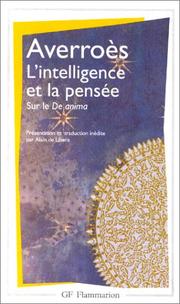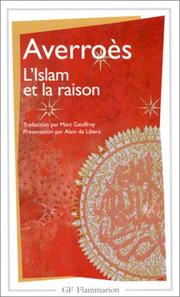| Listing 1 - 10 of 15 | << page >> |
Sort by
|
Book
ISBN: 9781648250118 1648250114 9781800104983 1800105150 9781800105157 Year: 2022 Publisher: Rochester, NY : University of Rochester Press,
Abstract | Keywords | Export | Availability | Bookmark
 Loading...
Loading...Choose an application
- Reference Manager
- EndNote
- RefWorks (Direct export to RefWorks)
The first collection of essays devoted to the Arabic philosopher Averroes's brilliant Commentary on Plato's "Republic," which survived the medieval period only in Hebrew and Latin translations.
Averroës, --- Plato. --- Averroës, --- Political science. --- Averroe¨s,
Book
ISBN: 9782262030261 226203026X Year: 2009 Publisher: Paris Perrin
Abstract | Keywords | Export | Availability | Bookmark
 Loading...
Loading...Choose an application
- Reference Manager
- EndNote
- RefWorks (Direct export to RefWorks)
Islamic philosophy --- Philosophy, Medieval --- Philosophie islamique --- Philosophie médiévale --- Averroës, --- Philosophie médiévale --- Averroës,
Book
ISBN: 1474268528 147426851X 1474268501 9781474268516 9781474268523 9781474268509 9781474268493 1474268498 Year: 2016 Publisher: London, UK New York, NY
Abstract | Keywords | Export | Availability | Bookmark
 Loading...
Loading...Choose an application
- Reference Manager
- EndNote
- RefWorks (Direct export to RefWorks)
"Elijah Del Medigo (1458-1493) was a Jewish Aristotelian philosopher living in Padua, whose work influenced many of the leading philosophers of the early Renaissance. His Two Investigations on the Nature of the Human Soul uses Aristotle's De anima to theorize on two of the most discussed and most controversial philosophical debates of the Renaissance: the nature of human intellect and the obtaining of immortality through intellectual perfection. In this book, Michael Engel places Del Medigo's philosophical work and his ideas about the human intellect within the context of the wider Aristotelian tradition. Providing a detailed account of the unique blend of Hebrew, Islamic, Latin and Greek traditions that influenced the Two Investigations, Elijah Del Medigo and Paduan Aristotelianism provides an important contribution to our understanding of Renaissance Aristotelianisms and scholasticisms. In particular, through his defense of the Muslim philosopher Averroes' hotly debated interpretation of the De anima and his rejection of the moderate Latin Aristotelianism championed by the Christian Thomas Aquinas, Engel traces how Del Medigo's work on the human intellect contributed to the development of a major Aristotelian controversy. Investigating the ways in which multicultural Aristotelian sources contributed to his own theory of a united human intellect, Elijah Del Medigo and Paduan Aristotelianism demonstrates the significant impact made by this Jewish philosopher on the history of the Aristotelian tradition."--Bloomsbury Publishing.
Concepts. --- Intellect. --- Jewish philosophy --- Knowledge, Theory of. --- Philosophy --- Philosophy, Medieval. --- History --- Averroës, --- Del-Medigo, Elijah, --- Influence.
Book
ISBN: 0809334143 9780809334148 9780809334131 0809334135 Year: 2015 Publisher: Carbondale
Abstract | Keywords | Export | Availability | Bookmark
 Loading...
Loading...Choose an application
- Reference Manager
- EndNote
- RefWorks (Direct export to RefWorks)
Rhetoric --- Aristotle. --- Fārābī. --- Avicenna, --- Averroës, --- Aristoteles. --- LANGUAGE ARTS & DISCIPLINES --- REFERENCE --- Rhetoric. --- Composition & Creative Writing. --- Writing Skills. --- Averroës, --- Fārābī. --- Rhetoric (Aristotle).

ISBN: 2080709747 9782080709745 Year: 1998 Volume: 974 Publisher: Paris: Garnier-Flammarion,
Abstract | Keywords | Export | Availability | Bookmark
 Loading...
Loading...Choose an application
- Reference Manager
- EndNote
- RefWorks (Direct export to RefWorks)
Philosophy of mind --- Psychology --- Intellect --- Philosophie de l'esprit --- Psychologie --- Intelligence --- Early works to 1800 --- Early works to 1850 --- Ouvrages avant 1800 --- Ouvrages avant 1850 --- Aristotle. --- Averroës, --- Averroës, --- Early works to 1800.

ISBN: 9782080711328 2080711327 Year: 2000 Volume: 1132 Publisher: Paris Flammarion
Abstract | Keywords | Export | Availability | Bookmark
 Loading...
Loading...Choose an application
- Reference Manager
- EndNote
- RefWorks (Direct export to RefWorks)
Islamic philosophy --- Truth --- God (Islam) --- Islam --- Philosophie islamique --- Vérité --- Dieu (Islam) --- Early works to 1800 --- Religious aspects --- Early works to 1800. --- Doctrines --- Ouvrages avant 1800 --- Aspect religieux --- Averroës, --- Vérité --- Averroës,
Book
ISBN: 9783110220018 3110220016 1282716336 9786612716331 3110220024 9783110220025 Year: 2010 Volume: 5 Publisher: Berlin: de Gruyter,
Abstract | Keywords | Export | Availability | Bookmark
 Loading...
Loading...Choose an application
- Reference Manager
- EndNote
- RefWorks (Direct export to RefWorks)
This book contains the first English translation of Abūl-Walīd Ibn Rushd's (Averroes') so-called Epitome of Aristotle's Metaphysics . The original Arabic text was composed around 1160 as a sort of appendix to a series of compendia of Aristotle's works on natural philosophy by the famous Andalusian philosopher. The two most interesting things about this work are the fact that Averroes restructures here the Aristotelian text according to his own conception of metaphysics, as opposed to his great literal commentary which follows the order of the Metaphysics section by section, and that he constantly revised this work over more than three decades. The present translation is based on a wide range of documents including, apart from the available Arabic editions, a number of medieval Arabic manuscripts not taken into consideration in these editions as well as the Renaissance translation into Latin prepared by Jacob Mantinus. It is accompanied by a commentary dealing with the major philosophical topics, Averroes' sources and problems of the transmission and constitution of the text. In addition, the most important variant readings of the manuscripts are noted in footnotes underneath the translation.
Metaphysics. --- Islamic philosophy --- Métaphysique --- Philosophie islamique --- Aristotle. --- Averroës, --- Aristotle. -- Metaphysics. --- God --- Ontology --- Philosophy --- Philosophy of mind --- Aristoteles. --- Averroes. --- Islamic Philosophy. --- PHILOSOPHY --- Metaphysics (Aristotle). --- 08.22 medieval philosophy. --- Rezeption. --- Islamische Philosophie. --- Arabisch. --- Metaphysica (Aristoteles). --- Aristoteles --- Aristoteles; Ta meta ta physika. --- Averroes; Talḫīṣ mā baʻda al-ṭabīʻa. --- Aristoteles, --- Metaphysica
Book
ISBN: 9788376830537 0521418488 9780521418485 9781139027410 1316314707 1316321401 1316308022 1316328082 1316331423 1316324745 1316318044 1139027417 1316287203 9781316318041 Year: 2015 Publisher: Cambridge [etc.] Cambridge University Press
Abstract | Keywords | Export | Availability | Bookmark
 Loading...
Loading...Choose an application
- Reference Manager
- EndNote
- RefWorks (Direct export to RefWorks)
As a philosopher, psychologist, and physician, the German thinker Hermann Lotze (1817–1881) defies classification. Working in the mid-nineteenth-century era of programmatic realism, he critically reviewed and rearranged theories and concepts in books on pathology, physiology, medical psychology, anthropology, history, aesthetics, metaphysics, logic, and religion. Leading anatomists and physiologists reworked his hypotheses about the central and autonomic nervous systems. Dozens of fin-de-siècle philosophical contemporaries emulated him, yet often without acknowledgment, precisely because he had made conjecture and refutation into a method. In spite of Lotze's status as a pivotal figure in nineteenth-century intellectual thought, no complete treatment of his work exists, and certainly no effort to take account of the feminist secondary literature. Hermann Lotze: An Intellectual Biography is the first full-length historical study of Lotze's intellectual origins, scientific community, institutional context, and worldwide reception.
Knowledge, Theory of --- Metaphysics --- Aristotle. --- Averroës, --- Giles, --- Aristoteles. --- Abū al-Walīd ibn Rushd, --- Abū al-Walīd Muḥammad ibn Aḥmad ibn Rushd, --- Abū el-Walīd ibn Roshd, --- Abuʼl-Walid Muhammad bin Rusjd, --- Alṿalid ibn Rushd, --- Averroè, --- Averróis, --- Bin Rusjd, Muhammad bin Ahmad, --- Ibn-e-Rushd, --- Ibn-i Rushd, --- Ibn Rashad, --- Ibn Rochd, --- Ibn Roshd, Abū el-Walīd, --- Ibn Roshd, --- Ibn Ruschd, --- Ibn Rušd, --- Ibn Rushd, --- Ibn Rushd al-Ḥafīd, --- Ibn Rushd, Abū al-Walīd, --- Ibn Rushd, Abū al-Walīd Muḥammad ibn Aḥmad, --- Ibn Rushd, Abul Walid Muhammad ibn Ahmad, --- Ibnu Rosjid, --- Ibnu Rusjd, --- ابن رشد، --- Muḥammad ibn Aḥmad ibn Rushd, --- Lotze, Hermann, --- Lotze, Rudolf Hermann, --- Lotze, Rudolph Hermann,
Book
ISBN: 0585059837 9780585059839 1438409451 Year: 1985 Publisher: Albany State University of New York Press
Abstract | Keywords | Export | Availability | Bookmark
 Loading...
Loading...Choose an application
- Reference Manager
- EndNote
- RefWorks (Direct export to RefWorks)
Philosophy, Medieval --- Causation --- Philosophy & Religion --- Philosophy --- Causality --- Cause and effect --- Effect and cause --- Final cause --- Beginning --- God --- Metaphysics --- Necessity (Philosophy) --- Teleology --- Medieval philosophy --- Scholasticism --- Averroës, --- Abū al-Walīd ibn Rushd, --- Abū al-Walīd Muḥammad ibn Aḥmad ibn Rushd, --- Abū el-Walīd ibn Roshd, --- Abuʼl-Walid Muhammad bin Rusjd, --- Alṿalid ibn Rushd, --- Averroè, --- Averróis, --- Bin Rusjd, Muhammad bin Ahmad, --- Ibn-e-Rushd, --- Ibn-i Rushd, --- Ibn Rashad, --- Ibn Rochd, --- Ibn Roshd, Abū el-Walīd, --- Ibn Roshd, --- Ibn Ruschd, --- Ibn Rušd, --- Ibn Rushd, --- Ibn Rushd al-Ḥafīd, --- Ibn Rushd, Abū al-Walīd, --- Ibn Rushd, Abū al-Walīd Muḥammad ibn Aḥmad, --- Ibn Rushd, Abul Walid Muhammad ibn Ahmad, --- Ibnu Rosjid, --- Ibnu Rusjd, --- ابن رشد، --- Muḥammad ibn Aḥmad ibn Rushd, --- Philosophy, Medieval. --- Causation.
Book

ISBN: 9461661908 9789461661906 9789462700468 946270046X Year: 2015 Publisher: Leuven, [Belgium] : Leuven University Press,
Abstract | Keywords | Export | Availability | Bookmark
 Loading...
Loading...Choose an application
- Reference Manager
- EndNote
- RefWorks (Direct export to RefWorks)
Ibn Rushd (1126-1198), or Averroes, is widely known as the unrivalled commentator on virtually all works by Aristotle. His commentaries and treatises were used as manuals for understanding Aristotelian philosophy until the Age of the Enlightenment. Both Averroes and the movement commonly known as 'Latin Averroism' have attracted considerable attention from historians of philosophy and science. Whereas most studies focus on Averroes' psychology, particularly on his doctrine of the 'unity of the intellect', Averroes' natural philosophy as a whole and its influence still remain largely unexplored. This volume aims to fill the gap by studying various aspects of Averroes' natural philosophical thought, in order to evaluate its impact on the history of philosophy and science between the late Middle Ages and the Early Modern Period.
Philosophy, Medieval. --- Islamic philosophy. --- Philosophy of nature --- Arabic philosophy --- Muslim philosophy --- Philosophy, Islamic --- Philosophy, Arab --- Medieval philosophy --- Scholasticism --- History. --- Averroës, --- Abū al-Walīd ibn Rushd, --- Abū al-Walīd Muḥammad ibn Aḥmad ibn Rushd, --- Abū el-Walīd ibn Roshd, --- Abuʼl-Walid Muhammad bin Rusjd, --- Alṿalid ibn Rushd, --- Averroè, --- Averróis, --- Bin Rusjd, Muhammad bin Ahmad, --- Ibn-e-Rushd, --- Ibn-i Rushd, --- Ibn Rashad, --- Ibn Rochd, --- Ibn Roshd, Abū el-Walīd, --- Ibn Roshd, --- Ibn Ruschd, --- Ibn Rušd, --- Ibn Rushd, --- Ibn Rushd al-Ḥafīd, --- Ibn Rushd, Abū al-Walīd, --- Ibn Rushd, Abū al-Walīd Muḥammad ibn Aḥmad, --- Ibn Rushd, Abul Walid Muhammad ibn Ahmad, --- Ibnu Rosjid, --- Ibnu Rusjd, --- ابن رشد، --- Muḥammad ibn Aḥmad ibn Rushd, --- Appreciation. --- Philosophy, Medieval --- Islamic philosophy --- History
| Listing 1 - 10 of 15 | << page >> |
Sort by
|

 Search
Search Feedback
Feedback About UniCat
About UniCat  Help
Help News
News